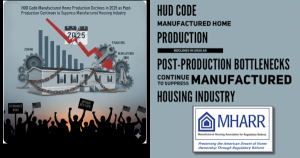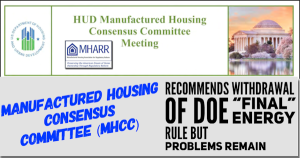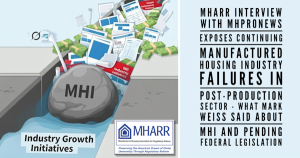[vc_row][vc_column][vc_column_text]
Washington, D.C., March 8, 2018 – The Manufactured Housing Association for Regulatory Reform (MHARR), in a February 27, 2018 communication to the Chief Executive Officer of Freddie Mac (copy attached), has demanded clarification of that organization’s implementation of the “Duty to Serve Underserved Markets” (DTS) in relation to a supposed “new class” of manufactured home being developed on a secretive/proprietary basis within the Manufactured Housing Institute (MHI) by the manufactured housing industry’s largest corporate conglomerates.
MHI, in recent news releases and published articles, has boasted that the concept for this “new class” of manufactured home, with a cost as high as $220,000.00, had already been presented to the two housing finance giants, Fannie Mae and Freddie Mac, and had been “well received.” And now, during a February 26, 2018 conference call meeting of Freddie Mac’s “Manufactured Housing Initiative Task Force” (MHIT), a Freddie Mac official, in the context of a discussion of current and prospective implementation of DTS, referred to an impending “new class of home” pilot project — never before addressed or even mentioned by Freddie Mac — to be implemented as early as the Summer of 2018, for a type of high-cost manufactured home that has not previously been built or marketed, let alone mass produced.
In the wake of the late-2017 approval by the Federal Housing Finance Agency (FHFA) of the grossly deficient and wholly inadequate DTS final implementation plans submitted by both Fannie Mae and Freddie Mac, there has been major confusion, both within and outside the HUD Code manufactured housing industry, regarding the relationship – or lack thereof – between DTS and the erstwhile “new class” of manufactured home being developed and touted by MHI and the industry conglomerates. Fueled by misleading “analyses,” strategically-targeted “leaks” and related commentary, this confusion has proliferated, particularly with respect to the harm that a nexus between a proprietary “new class” of manufactured homes and DTS would cause for smaller industry businesses and for consumers of affordable housing, by, among other things, relegating traditional, affordable manufactured housing to the second-class, “trailer” status that the industry has fought for decades to overcome.
As MHARR has advised Freddie Mac, there is no legitimate or valid basis for diverting any aspect of DTS – which was enacted by Congress ten years ago to promote and advance the availability of traditional, inherently affordable, non-subsidized manufactured housing for lower and moderate-income homebuyers – to a “new class” of homes that, at a price-point reaching up to $220,000, would not be “affordable.”
To start with, no such “new class” of homes have ever been produced. As a result, there is no conceivable “loan performance” data – the absence of which Fannie Mae and Freddie Mac have used for decades, and continue to use, despite DTS — as an excuse for failing to provide any level of market-significant chattel financing support for the existing “class” of manufactured homes. By diverting any portion of DTS to this “new class” of manufactured home, the Government Sponsored Enterprises (GSEs) would simply be continuing their long-established pattern and practice of discrimination against traditional manufactured housing and manufactured homebuyers.
Second, no such program, involving a “new class” of manufactured home was included in the 2018-2020 DTS implementation plan submitted by Freddie Mac — and approved by FHFA. As a result, any such program under DTS would be unauthorized by Freddie Mac’s federal regulator and, therefore, unlawful under the GSEs’ conservatorship.
Third, diverting any portion whatsoever of DTS support to a proprietary product developed and manufactured on an exclusive or exclusionary basis by one group of competitors and not generally available or accessible to other industry producers, would be a blatantly anti-competitive action by Freddie Mac.
Fourth, the diversion of any portion whatsoever of DTS support to a “new class” of homes with a reported retail cost as high as $220,000.00 instead of existing types of manufactured housing, which are inherently affordable for very low-, low- and moderate-income American families without the need for costly government subsidies, would violate the letter, intent and fundamental purpose of DTS, with entirely predictable anti-competitive impacts.
In part, this activity appears to be a larger-scale, updated version of the ill-fated “MH Select” program floated by Fannie Mae more than a decade ago. That program, which reportedly resulted in zero loans, sought to deflect from the GSEs’ near-total failure to support the manufactured housing market (and low-, lower- moderate-income manufactured homebuyers) by conditioning securitization and secondary market support for manufactured homes on mandatory features that exceeded the HUD Code standards and undermined the affordability of those homes. Apparently, with the GSEs having failed to learn any lessons from the MH Select fiasco, Freddie Mac now appears to be following a similar course to evade fulfilling its statutory DTS obligation to provide market support for the existing class of affordable manufactured homes, thus continuing the GSEs’ 40-year habit of talking about providing market-significant support for HUD Code consumer financing, but, in actuality, doing virtually nothing.
MHARR, on the other hand, will continue to press for the full, complete and robust implementation of DTS with respect to the existing class of affordable manufactured homes, without any diversion, deferral, or further delay of the Duty to Serve Underserved Markets involving any alleged, secretive, “new class” of homes.
The Manufactured Housing Association for Regulatory Reform is a Washington, D.C.-based national trade association representing the views and interests of independent producers of federally-regulated manufactured housing.


[/vc_column_text][/vc_column][/vc_row]













